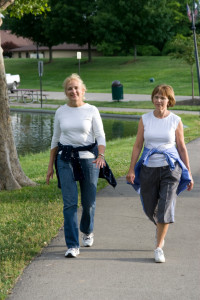One thing which really annoys me, and many others our age, is that many younger people think just because you have crossed the 60 mark you are over the hill. Well to me it certainly doesn’t mean you have to slow down and neither should you.
In fact the only thing it does mean is that we need to establish and maintain a good exercise program as it becomes more and more crucial to our health as we age.
And did you also know, seniors who exercise are much more likely to delay or even prevent age-related diseases than those who don’t exercise.
And that is relative to all age groups.
Do you think you should be slowing down just because you have hit 60 years old?
Well think again.
Improving your fitness levels in your 60’s can help reduce your risk of disease, increase your strength, and boost energy levels. Improved fitness at any age can positively impact a person’s cognitive function, as well.
It’s no big secret that our bodies change as we age. But it’s also not surprising to find that today’s seniors are staying fit, flexible, and active well into their 80’s.
Although genetics does play a role in age-related diseases like osteoporosis and arthritis, a good exercise program and a well-balanced diet can delay or prevent many age-related conditions.
But even non-exercisers can begin to improve their fitness levels, regardless of age.

It’s important for a person in their 60’s to get a check-up from your family doctor before beginning any kind of exercise program. After getting the “all-clear” from your doctor, daily walking is a great beginner exercise. And walking with a friend can help keep you motivated.
Fitness for Longevity
Exercise is an essential part of extending life and also preserving quality of life for seniors.
Fitness is just as important to a person in their 60’s as it is to a person in their 20’s. And studies confirm that older people can tone, strengthen, and even build muscle tissue well into old age.
The American Heart Association suggests that people in their 60’s should build up to an exercise program that consists of moderate intensity exercise for a minimum of 30 minutes at least 5 days a week.
Be sure to include an aerobic component to your exercise plan for heart health, a stretching component for balance and flexibility, and a resistance training component to keep muscles lean and toned.
Benefits of Exercise for the Aging Community
Besides the obvious advantages of maintaining a healthy weight and keeping muscles toned, exercise has many more benefits for ageing bodies. Exercise can help aid digestion, keep the bowels moving regularly, and can help keep blood sugar levels regulated.
Exercise also reduces body aches and pains, helps lower blood pressure, and improves balance. Adequate weight training can also maintain bone density levels which can delay or prevent the onset of osteoporosis.
The fact of the matter is that we are all ageing whether we like it or not and the older I get the more I realize I have to hit the gym if I am going to keep going.
But the big question is: Will you age in a healthy and graceful manner or are you going to go into old age semi-disabled?
I know which option I prefer.
Your fitness level has a lot to do with how you enter into your golden years. So why not have a chat with a fitness professional now – your body will thank you for it in the years to come.
Getting fit and staying fit will add an abundance of life to your years and prevent or delay a whole host of debilitating conditions. When are you going to start?
“I’m not telling you it is going to be easy, I’m telling you it’s going to be worth it.”
Leave a Reply